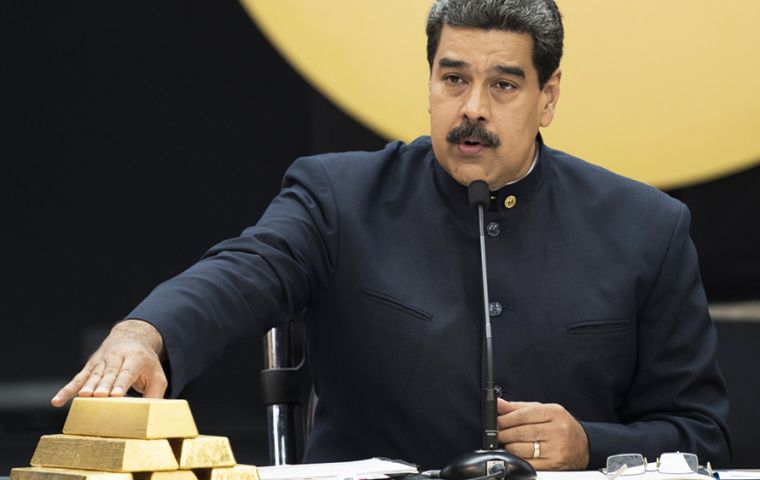MercoPress. South Atlantic News Agency
Desperate Maduro regime appealing to the sale of central bank's gold
 Legislator Angel Alvarado claimed in an interview the Maduro regime plans “to sell the gold abroad illegally”
Legislator Angel Alvarado claimed in an interview the Maduro regime plans “to sell the gold abroad illegally” At least 8 tons of gold were removed from the Venezuelan central bank’s vaults last week, an opposition legislator and three government sources told Reuters, in the latest sign of President Nicolas Maduro’s desperation to raise hard currency amid tightening sanctions.
The gold was removed in government vehicles between Wednesday and Friday last week when there were no regular security guards present at the bank, Legislator Angel Alvarado and the three government sources said.
“They plan to sell it abroad illegally,” Alvarado said in an interview.
Alvarado and the government sources did not say where the central bank was sending the gold. They said the operation took place while central bank head Calixto Ortega was abroad on a trip.
In 2018, 23 tons of mined gold were transported from Venezuela to Istanbul by plane, according to sources and Turkish government data.
The central bank bought part of this gold from primitive gold-mining camps in the south of Venezuela and exported it to Turkey and other countries to finance the purchase of basic food supplies, given widespread shortages, according to more than 30 people with knowledge of the trade.
Some 20 tons of monetary gold were also removed from the central bank’s vaults in 2018, according to the bank’s data, leaving 140 tons remaining, the lowest level in 75 years.
Abu Dhabi investment firm Noor Capital said on Feb. 1 that it bought 3 tons of gold on Jan. 21 from the Venezuelan central bank and would not buy more until Venezuela’s situation stabilized. Noor Capital said its purchase was in accordance with “international standards and laws in place” as of that date.
Maduro’s government has been seeking to repatriate some 31 tons of gold in the Bank of England’s vaults on fears it could be caught up in international sanctions on the country.
Venezuelan Foreign Minister Jorge Arreaza said on Wednesday, during a United Nations meeting in Geneva, that the Bank of England had blocked the government’s assets.
Maduro’s government has resorted to selling off gold after falling oil production, the country’s wider economic collapse and mounting sanctions hit public income and made it hard for the country to access credit.





Top Comments
Disclaimer & comment rulesCommenting for this story is now closed.
If you have a Facebook account, become a fan and comment on our Facebook Page!